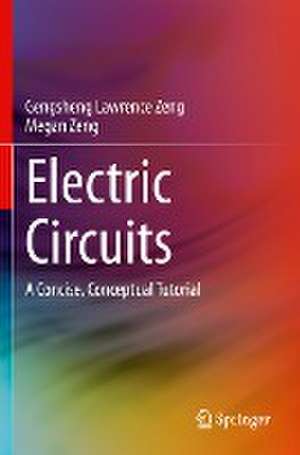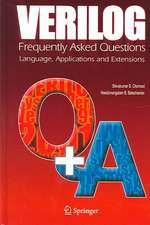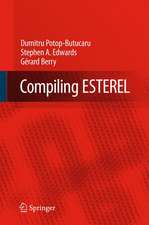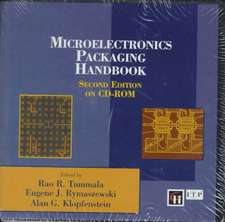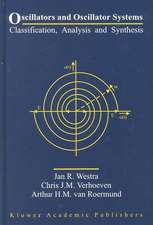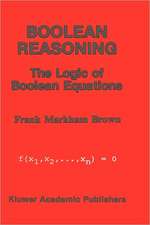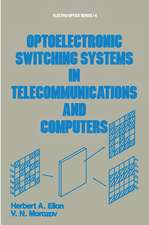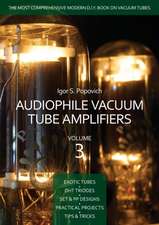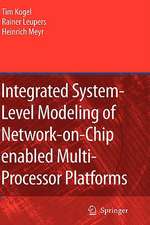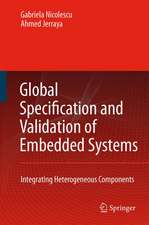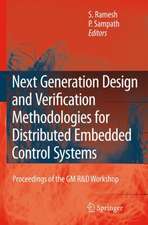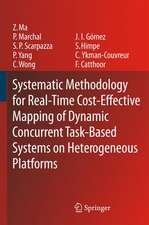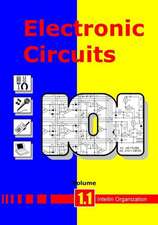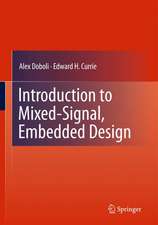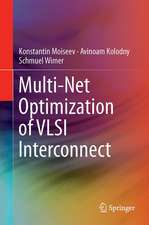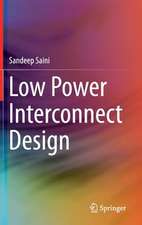Electric Circuits: A Concise, Conceptual Tutorial
Autor Gengsheng Lawrence Zeng, Megan Zengen Limba Engleză Paperback – 19 feb 2022
| Toate formatele și edițiile | Preț | Express |
|---|---|---|
| Paperback (1) | 273.83 lei 6-8 săpt. | |
| Springer International Publishing – 19 feb 2022 | 273.83 lei 6-8 săpt. | |
| Hardback (1) | 281.35 lei 6-8 săpt. | |
| Springer International Publishing – 18 feb 2021 | 281.35 lei 6-8 săpt. |
Preț: 273.83 lei
Nou
Puncte Express: 411
Preț estimativ în valută:
52.40€ • 54.14$ • 43.61£
52.40€ • 54.14$ • 43.61£
Carte tipărită la comandă
Livrare economică 25 martie-08 aprilie
Preluare comenzi: 021 569.72.76
Specificații
ISBN-13: 9783030605179
ISBN-10: 3030605175
Pagini: 352
Ilustrații: X, 352 p. 275 illus., 48 illus. in color.
Dimensiuni: 155 x 235 mm
Greutate: 0.51 kg
Ediția:1st ed. 2021
Editura: Springer International Publishing
Colecția Springer
Locul publicării:Cham, Switzerland
ISBN-10: 3030605175
Pagini: 352
Ilustrații: X, 352 p. 275 illus., 48 illus. in color.
Dimensiuni: 155 x 235 mm
Greutate: 0.51 kg
Ediția:1st ed. 2021
Editura: Springer International Publishing
Colecția Springer
Locul publicării:Cham, Switzerland
Cuprins
Introduction.- Voltage, Current, and Resistance.- DC Power Supply and Multimeters.- Ohm’s Law.- Kirchhoff’s Voltage Law (KVL).- Kirchhoff’s Current Law (KCL).- Resistors in Series and in Parallel.- Voltage Divider and Current Divider.- Node-Voltage Method.- Mesh-Current Method.- Superposition.- Thévenin Equivalent.- Norton Equivalent.- Maximum Power Transfer.- Operational Amplifiers.- Inductors.- Capacitors.- Analysis of a Circuit by Solving Differential Equations.- First-Order Circuits.- Sinusoidal Steady-State.- Function Generators and Oscilloscopes.- Mutual Inductance and Transformers.- Fourier Series.- Laplace Transform in Circuit Analysis.- Fourier Transform in Circuit Analysis.- Second-Order Circuits.- Filters.- Wrapping Up.
Notă biografică
Larry Zeng is an Associate Professor at Utah Valley University and an Adjunct Professor at the University of Utah. He is an IEEE Fellow with 166 peer-reviewed scientific journal papers. He also published 3 books.
Megan Zeng is a student at the University of California, Berkeley. She currently works for electrical engineering courses as part of the teaching staff.
Megan Zeng is a student at the University of California, Berkeley. She currently works for electrical engineering courses as part of the teaching staff.
Textul de pe ultima copertă
This textbook serves as a tutorial for engineering students. Fundamental circuit analysis methods are presented at a level accessible to students with minimal background in engineering. The emphasis of the book is on basic concepts, using mathematical equations only as needed. Analogies to everyday life are used throughout the book in order to make the material easier to understand. Even though this book focuses on the fundamentals, it reveals the authors' deep insight into the relationship between the phasor, Fourier transform, and Laplace transform, and explains to students why these transforms are employed in circuit analysis.
- Written to be used as a “personal tutor” for a college student who is taking a lower level electric circuits course;
- Focuses on one concept per chapter, using numerous solved examples to make the presentation simple, concise, clear and to the point;
- Explains concepts from a “bird's-eye view” so readers can grasp how concepts fit into a larger context;
- Covers practical, hands-on topics, such as how to use a multimeter, how to use an oscilloscope, and how to use a power supply;
- Includes exercises at the end of each chapter with detailed, step-by-step solutions at the end of the book, making this an ideal tool for self-study.
Caracteristici
Written to be used as a “personal tutor” for a college student who is taking a lower level electric circuits course Focuses on one concept per chapter, using numerous solved examples to make the presentation simple, concise, clear and to the point Explains concepts from a “bird's-eye view” so readers can grasp how concepts fit into a larger context Covers practical, hands-on topics, such as how to use a multimeter, how to use an oscilloscope, and how to use a power supply Includes exercises at the end of each chapter with detailed, step-by-step solutions at the end of the book, making this an ideal tool for self-study
